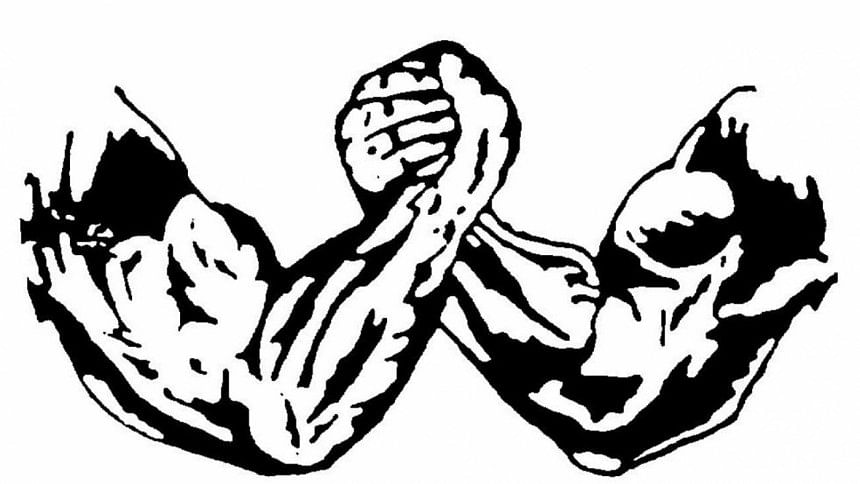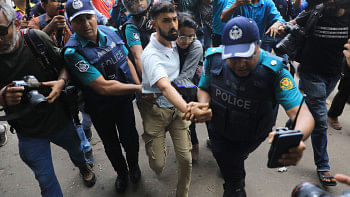Behind the politics of ATTRITION

ONE may wonder if the principal political parties of Bangladesh have embarked upon an ominous battle of wearing down the opponent. The astounding actions of our major political actors would perhaps testify to the substance of such a premonition. Extreme rigidity in a democratic dispensation is not at all desirable. It also needs to be said that the present stalemate is not the first instance when political actors have ventured to act their own way, come what may.
It is indeed sad to note that the civil society activists, while emphasising upon the urgency of holding dialogue with opposition political party have not appropriately condemned the petrol- bomb throwing and arson and have not visited the unfortunate victims of such action. It would be ridiculous to believe that these ghastly actions are not inspired by the opposition's protests.
One may, with some justification, accuse the present government of somehow retaining the levers of power by resorting to the constitutional act of striking down the provision of non-partisan caretaker government to oversee the general election. The question is why is a constitutionally appropriate action not acceptable to the major opposition political party? In fact, what has gone wrong in overseeing a general election under the watch of a political government? Have the regulatory bodies that are constitutionally oath-bound to impartially discharge their functions in conducting general election faulted? Have public servants deviated from the correct legal mode and displayed partisan proclivities?
When a republic comes to birth, it is the leaders who produce the institutions. Later, it is the institutions which produce the leaders. Sadly, in our case eloquence has flourished most when public affairs were in deplorable conditions. Consequently, we find ourselves at a crossroads of history insofar as our democratic progression is concerned. The premonition is, if we take too many faulty steps and mistake the dross for the gold we shall render ourselves unfit for civilised conduction of public affairs.
The civil service owes its loyalty to the government of the day, irrespective of political party, and it is imperative that it avoids creating the impression of political bias. The service has to serve governments of all political persuasions. The civil servants are expected to conduct themselves in a manner that they deserve and retain the confidence of ministers and be able to establish the same relationship with those whom they may be required to serve in some future administration.
Insofar as the regulatory agencies are concerned, the allegation is that the interests of the State have often been mixed up with the interests of the party in power. Consequently, all concerned are losing faith in the propriety of the actions of such bodies that play a vital role in fair and orderly conduction of election.
The need is to ensure that public servants are not preoccupied with inconsequential matters to the detriment of national interests. This is paramount because in our situation public leaders are publicly expressing doubts about the neutrality and integrity of vital organs of the State whose functions can neither be arrogated to others nor be privatised. Therefore, the fears regarding fair election need to be allayed.
Over the years, the polarisation of different occupational and service organizations along the political lines has caused concern. The appointees of particular years are considered more loyal and pliable and are rewarded, causing manifest discrimination. Such actions are adversely affecting the administrations that are pivotal in ensuring fair election.
The responsibility for creating and sustaining an impartial and fair public service principally falls on political leadership. They have to be strongly and actively supported by the judiciary and the media, amongst others. The alleged polarisation and divisive trends have to be effectively halted in order for the incumbent political government to be acceptably charged with the responsibility of overseeing the general election.
We will do well to remember that the modern State is a political contrivance for civilised people to lead a lawful life. The impartial and dispassionate performance of some vital State institutions, made possible by political wisdom, largely ensures the success of such an existence. Prominent among these institutions are the judiciary, the EC, the public service, and the media whose positive role guarantees the fulfillment of societal goals.
The State must not be stripped of its benevolent character and the government should not appear less than representative by reason of partisan action. Those in charge of the affairs of the State and their likely successors should look beyond the immediate compulsions in order to be true guardians. The imperative is to create ethos befitting a democracy.
While the caretaker arrangement might be construed as a scathing indictment on the unreliability of the political class to fairly conduct national elections, it is also a fact that the determined movement for its restoration is displaying signs of desperation, leading to an ominous future. In a situation where neither the people nor the country might figure as the first priority, our altruistic virtues would be open to question.
The constitution of the republic enshrines fundamental principles of equity and fair play, but in the absence of proactive actions by the principal actors they will remain merely as counsels of moderation. If our society proves to be so perilously polarised that the spirit of moderation is marginally present then nobody can help us. The evasion of responsibility would actually mean the demise of the spirit of moderation. Surely, we do not intend to perish.
The nation urgently requires the exercise of negotiating skill with dexterity and caution. This is not an insurmountable task for our politicians. They may or may not seek the services of persons that are not politically affiliated, but the responsibility of seeking resolution through dialogue and compromise cannot be shrugged off. For that to commence the petrol-bomb throwing and arson must end immediately. Surely, we can expect our politicians not to press a partisan advantage to its bitter end.
The writer is a columnist of The Daily Star.

 For all latest news, follow The Daily Star's Google News channel.
For all latest news, follow The Daily Star's Google News channel. 



Comments